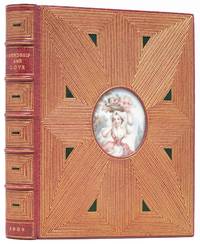first edition
1931 · London
by Churchill, Winston S.
London: Thornton Butterworth Limited, 1931. First edition. Near Fine. Six vols, octavo. Original blue cloth, spines lettered in gilt, front covers lettered in blind. A few of the later volumes with contemporary or later ownership inscriptions or bookplate (not of the recipient). Light bumping and nicks to extremities, some spotting to edges and contents. A Near Fine set overall.
First editions, first impressions, the first volume a pre-publication presentation copy to the newspaper editor Robert Donald, with an autograph letter signed from the author mounted to the front free endpaper, “My Dear Donald, I send you herewith a copy of my new book, with my best wishes. Yours sincerely, Winston S. Churchill April 7. 1923”.
Donald (1860-1933) was editor of the Daily Chronicle from 1902 to 1918, and The People and The Referee from 1922 to 1924. He was chairman of the Empire Press Union from 1915 to 1926. He had been a close ally of Lloyd George and later of Ramsay Macdonald. In the 1920s he was closely concerned with public affairs and published three books on the problems of reconstruction in post-war Europe: A Danger Spot in Europe (1925), The Tragedy of Trianon (1928), and The Polish Corridor and the Consequences (1930).
The first volume of Churchill’s mammoth history of the First World War was published on 10 April 1923. Churchill presumably sent the volume to Donald for review in his papers. The People carried a review on 15 April, “Whatever may be thought of Mr. Winston Churchill’s career as a statesman, no one will deny that he is a brilliant writer. His new book on the World Crisis, which includes the first year of the war, is a real epic, written in the grand manner.” The World Crisis deals with Churchill’s reorganization of the Royal Navy in the years leading up to the war, defends his Gallipoli policy, and criticizes Haig’s strategy. “Although parts of The World Crisis were highly autobiographical, drawing on documents from Churchill's private papers, the book as a whole was a stupendous narrative of the war in Europe featuring masterly set-piece accounts of major battles. Dictated to secretaries as he strode up and down the room, it exhibited his passionate interest in war and his romantic conception of the ‘true glory’ of the troops who perished on the Somme” (ODNB).
Cohen A69.2(I).b (second state, no priority of issue); A69.2(II).a; A69.2(III-1 & 2).a; A69.2(IV).b (second state, no priority of issue); A69.2(V).a. Near Fine. (Inventory #: 6889)
First editions, first impressions, the first volume a pre-publication presentation copy to the newspaper editor Robert Donald, with an autograph letter signed from the author mounted to the front free endpaper, “My Dear Donald, I send you herewith a copy of my new book, with my best wishes. Yours sincerely, Winston S. Churchill April 7. 1923”.
Donald (1860-1933) was editor of the Daily Chronicle from 1902 to 1918, and The People and The Referee from 1922 to 1924. He was chairman of the Empire Press Union from 1915 to 1926. He had been a close ally of Lloyd George and later of Ramsay Macdonald. In the 1920s he was closely concerned with public affairs and published three books on the problems of reconstruction in post-war Europe: A Danger Spot in Europe (1925), The Tragedy of Trianon (1928), and The Polish Corridor and the Consequences (1930).
The first volume of Churchill’s mammoth history of the First World War was published on 10 April 1923. Churchill presumably sent the volume to Donald for review in his papers. The People carried a review on 15 April, “Whatever may be thought of Mr. Winston Churchill’s career as a statesman, no one will deny that he is a brilliant writer. His new book on the World Crisis, which includes the first year of the war, is a real epic, written in the grand manner.” The World Crisis deals with Churchill’s reorganization of the Royal Navy in the years leading up to the war, defends his Gallipoli policy, and criticizes Haig’s strategy. “Although parts of The World Crisis were highly autobiographical, drawing on documents from Churchill's private papers, the book as a whole was a stupendous narrative of the war in Europe featuring masterly set-piece accounts of major battles. Dictated to secretaries as he strode up and down the room, it exhibited his passionate interest in war and his romantic conception of the ‘true glory’ of the troops who perished on the Somme” (ODNB).
Cohen A69.2(I).b (second state, no priority of issue); A69.2(II).a; A69.2(III-1 & 2).a; A69.2(IV).b (second state, no priority of issue); A69.2(V).a. Near Fine. (Inventory #: 6889)












